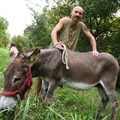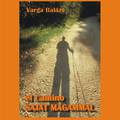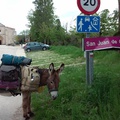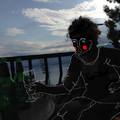HU:
Felmérések alapján Európa kulturális értékei közül a legszélesebb körben ismert elem nem más, mint Don Quijote története. A világ 100 legjobb regényét a kultúrára tett hatásuk szempontjából összeállító bizottság 99-et egyenrangúként sorol fel, de kiemeli közülük Cervantes barokk művét a búsképű lovagról.
Ezeket a Wikipediától tudom. Ennek alapján azt viszont mindenki tudja magától, miről szól a Don Quijote: egy őrültről, aki átszeli Spanyolországot és közben ostobaságokat művel.
Az angol romantikus költő, Byron szerint Don Quijote története a világirodalom legszomorúbb sztorija. De mitől olyan szomorú ez a mókás lovagparódia? Talán, mert az önjelölt hős útja során egyre világosabbá válik, hogy valójában nem ő az igazi őrült, hanem a kor, amelyben élnie kell, és a társadalom, amely körülveszi.
De egyben ez teszi őt példaképpé! Egy erkölcsileg kiüresedett világban keresi az értéket, és magasról tesz a valóságra, nem köt kompromisszumokat. Don Quijote egy általa magasztalt korba, a lovagi értékek világába vágyik, és belül teremti meg azt. Szomorú a történet, mert a külső, materiális valóságban szükségszerű a bukása, de erkölcsi fölénye soha, egy percig sem inog meg. Vajon melyik a fontosabb, illetve elválasztható-e egyáltalán a kettő egymástól?
/Cervantes és regényhősei Madridban (Plaza de- España)/
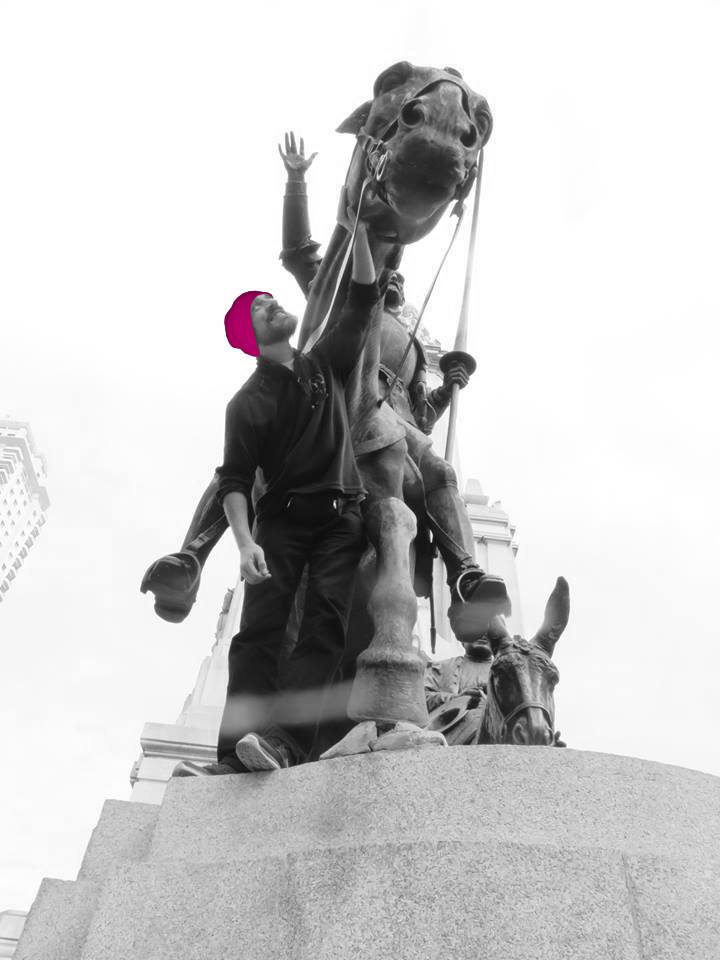 A legatyásodott la manchai nemes paripája egy öreg, csontos csődör, akit Rocinanténak nevez. „Rocin” a régi kasztíliai nyelvben gebét jelent, az „ante” (=előtt, korábban) pedig névutóként változtat a szó jelentésén: a ló korábban egy gebe volt, de már a világ legjobb lova, akinek erejéről és gyorsaságáról hőstörténetek regélnek. A névadással tehát a lovag önmagára reflektál: tisztában van a külső valósággal, csak nem hajlandó alkalmazkodni hozzá. Egy nagyon erős, hosszan kifejtett monológjában elmagyarázza: azzal is tisztában van, hogy plátói szerelme, a szűziesen gyönyörű Dulcinea valójában egy tenyeres-talpas némber, akin már végigment a fél falu, de az ő hősi élete szempontjából ez teljességgel irreleváns, hiszen neki egy bálványra van csak szüksége, akit a zászlajára tűzve végrehajthatja hőstetteit. Mi ez, ha nem a fenomenológiai pszichológia és a pozitív szemlélet ideológiájának elővételezés Cervantes részéről, korát vagy 4 évszázaddal megelőzve?! Te teremted a valóságodat, a lelkiállapotod nem az ún. tényektől, hanem az értelmezésedtől függ.
A legatyásodott la manchai nemes paripája egy öreg, csontos csődör, akit Rocinanténak nevez. „Rocin” a régi kasztíliai nyelvben gebét jelent, az „ante” (=előtt, korábban) pedig névutóként változtat a szó jelentésén: a ló korábban egy gebe volt, de már a világ legjobb lova, akinek erejéről és gyorsaságáról hőstörténetek regélnek. A névadással tehát a lovag önmagára reflektál: tisztában van a külső valósággal, csak nem hajlandó alkalmazkodni hozzá. Egy nagyon erős, hosszan kifejtett monológjában elmagyarázza: azzal is tisztában van, hogy plátói szerelme, a szűziesen gyönyörű Dulcinea valójában egy tenyeres-talpas némber, akin már végigment a fél falu, de az ő hősi élete szempontjából ez teljességgel irreleváns, hiszen neki egy bálványra van csak szüksége, akit a zászlajára tűzve végrehajthatja hőstetteit. Mi ez, ha nem a fenomenológiai pszichológia és a pozitív szemlélet ideológiájának elővételezés Cervantes részéről, korát vagy 4 évszázaddal megelőzve?! Te teremted a valóságodat, a lelkiállapotod nem az ún. tényektől, hanem az értelmezésedtől függ.
Társa és barátja, a szintén jó szándékú, de végtelenül egyszerű Sancho Panza a másik nagy bölcs. Őt nem érdekli a hősi hírnév, szíve szerint semmilyen magas eszmét nem követne, csak jókat enne-inna, élne gondtalanul, békében. Ennek megfelelően, Don Quijote fegyverhordozójaként rendkívül szórakoztatóakat vitázik urával, aki azzal kecsegteti, hogy kalandjaik sikerével egy sziget kormányzójává teszi őt. Amikor pedig – puszta heccből – tényleg kormányzó lesz belőle egy epizód erejéig, kiderül, hogy gyakorlatias egyszerűsége valódi bölcsességet rejt: egy csomó probléma csupán álprobléma, ha nem fogadjuk el természetesként azt a rengeteg természetellenes szennyeződést, amit a kor társadalma traktál ránk.
Sancho hátas jószága egy szamár, akire a magyar fordítás „a Szürke”-ként hivatkozik (eredetileg Rucio, ami a régi spanyolban a szürke egyik árnyalata lehet az ötvenből: a szamárszürke). Amikor a spanyolok megtudják, hogy van egy Rocinantém, aki egy szamár, meg szokták kérdezni: akkor én most Don Quijote vagyok vagy Sancho. Nos, mindkettő. Ahogy én vagyok a tücsök és a hangya is.
Vitázok is magammal vérre menően. Ez a blog is az önmagammal folytatott polémiák részeredményeit készül összefoglalni…
Don Quijotét érzékenysége bezárkózáshoz (ma tán úgy mondanánk, hogy depresszióhoz) vezette: kora értékválsága elől könyvtárába csukta magát a lovagi történetek közé. De végül kitört, és – hogy úgy mondjam – abbahagyta álmodni az életet, és elkezdte élni az álmait. (Bizony, a naplementés képekre írható, Facebookra posztolható, Oravecz Coelho-i semmitmondó, nyálas hatásvadászat klisémentes verzióit kevésbé szájbarágósan, tartalommal is ellátva megtalálhatod a klasszikus szépirodalomban, hajrá.) Ez lenne a projektem lényege. Depresszió vagy rezignáció helyett álmok és küzdés, plusz némi kultúrmisszió. Boldoggá tenne, ha önpolémiám másnak is ihletet, erőt vagy motivációt adhatna. Tanár és pszichológus lennék, a hivatástudat él; problémám a rendszerrel van, nem a szakmai identitásommal.
Segítőm a bennem élő Sancho Panza, aki csak a természetből fakadóhoz alkalmazkodik, nem érdekli semmilyen cafrang, megkérdőjelez mindent, ami fizikai vagy mentális energiát igényel, és nem szükséges vagy hasznos. Így vagyok én például a pénzzel, ami minek. A kérdésre, hogy mi természetes és mi nem, maga a természet adja meg a választ, minden nap, minden pillanatban. A természet közelsége rendszeres, vagy inkább folyamatos istenélményt provokál, az istenélmény pedig az élet értelmességébe vetett hitet, ami nyilvánvaló alapfeltétele a boldogságnak. Nekem ezért fontos, hogy növényekkel és állatokkal körülvéve, az elemeknek és a természeti erőknek alá- és mellérendelve, éppen ezért velük összhangra törekedve éljem mindennapjaimat.
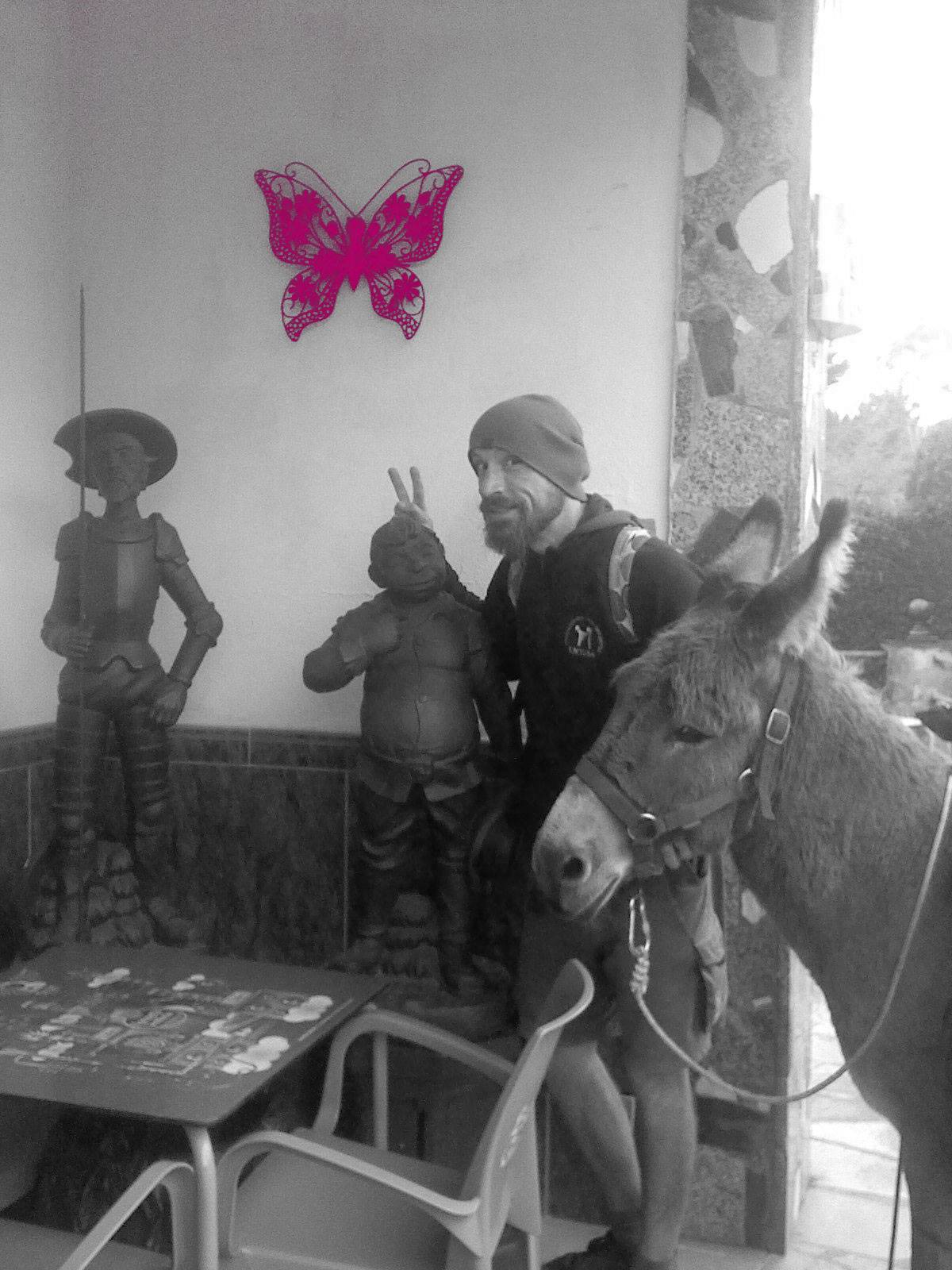
Szóval ezért Rocinante. És erre rímel ugyebár "Rolandante".
Roland, az ófrancia mondahős-druszám Don Quijote egyik lovagi példaképe. Andante spanyolul és olaszul is ugyanazt jelenti, zenei utasításként ismerhetjük: sétálva, lassacskán lépegetve – mintha csak az utam kottája felé lenne írva. A poklot és a mennyet is megjárt reneszánsz Dantéról már ne is beszéljünk.
A chilei alkimista Antonio[1] indián kártyákból azt olvasta ki, hogy a totemállatom a gyík. Magamtól a szamárra tippeltem volna, haha. A gyík a kő alatti hűvösben és biztonságban álmodja a jövőt, és a megfelelő pillanatra vár, hogy előbújhasson. Talán itt az idő előbújni a Don Quijote-i megmérettetésekhez, vállalva akár a bukást is…:)
[1] Galicia tartományba érve, Triacastelából két különböző úton juthatunk el Sarria városkába: indulhatunk Samos vagy San Xil felé is. Antonio ásványszakértő, egyike a sok látni-érdemes embernek, akiket megismerhettem; a Camino de San Xil mentén lakik. Kb. fél km-rel kell letérni a caminoról, hogy ráleljünk. Az úton egy tábla hirdeti ásványkiállítását, amit bárki meglátogathat, ihat egy teát, relaxálhat a képzőművészeti alkotásaival berendezett meditációs szobában stb.
----------------------------------------------------------------------------------------------
EN:
According to various studies the story of Don Quixote is the most well-known among Europe’s cultural values. A commission collecting the world’s 100 best novels from the aspect of their cultural impact, lists 99 peer to peer amongst them, meanwhile highlighting Cervantes’ baroque masterpiece of them all.
It seems that everyone knows what Don Quixote is about: a crazy fellow crosses Spain and meanwhile doing silly things.
According to the English romantic poet Byron, Don Quixote’s is the saddest story of the world literature.
But why? Why is this funny knight parody actually sad? Maybe because during the voyage of this self-proclaimed hero it becomes absolutely clear that in fact not he is the real mad one, but the age, in which he has to live as well as the society surrounding him.
But it is also what makes him an exemplar! He is searching for value in a morally empty world and he neither gives a shit about the reality, nor enters into compromises. Don Quixote longs for his vaunted era, for the world of knightly values, and he creates it within himself. The story is sad for his inevitable fall in the external materialistic reality, nevertheless his moral superiority is never shaken, not even for a second... Which is the more important? and also whether these two are separable?
/Statue of Cervantes and his novel's heroes in Madrid/ The steed of this impoverished nobleman of La Mancha is an old, bony stallion that he names Rocinante. “Rocin” means nag (~a cripled horse) in old Castilian language, and “ante” (=before, previously) as a postposition changes the meaning of the word: the horse had been an old bad nag, but now it is the world’s best steed, of whose power and strength heroic legends speak. Thus, by naming his horse the knight reflects on himself: in fact, he’s fully aware of the external reality, he just refuses to adapt to it. In one of his very powerful, lengthy monologues he explains that he is also aware that his platonic love, the chastely beautiful Dulcinea is actually a blowsy peasant cunt that half of the village population has already done, still it is irrelevant from his heroic aspect, because he needs an idol with whom on his flag he can perform his feats. What is it if not Cervantes’ anticipation of the phenomenological psychology and the positive approach, some 4 centuries ahead of his age: you create your own reality; your state of mind depends not on the facts, but on your personal interpretation.
The steed of this impoverished nobleman of La Mancha is an old, bony stallion that he names Rocinante. “Rocin” means nag (~a cripled horse) in old Castilian language, and “ante” (=before, previously) as a postposition changes the meaning of the word: the horse had been an old bad nag, but now it is the world’s best steed, of whose power and strength heroic legends speak. Thus, by naming his horse the knight reflects on himself: in fact, he’s fully aware of the external reality, he just refuses to adapt to it. In one of his very powerful, lengthy monologues he explains that he is also aware that his platonic love, the chastely beautiful Dulcinea is actually a blowsy peasant cunt that half of the village population has already done, still it is irrelevant from his heroic aspect, because he needs an idol with whom on his flag he can perform his feats. What is it if not Cervantes’ anticipation of the phenomenological psychology and the positive approach, some 4 centuries ahead of his age: you create your own reality; your state of mind depends not on the facts, but on your personal interpretation.
His fellow and friend, an also good-willing, but extremely simple peasant Sancho Panza is the other genuine wise. He is not interested in the heroic fame, his heart wouldn’t follow any fancy ideology, he would just have eat and drink and live his life in peace and rest. Accordingly, as Don Quixote’s squire, he continuously argues in a very entertaining way with his master, who promises to make him the governor of an island following the success of their adventures. However, when he – just for the hell of it – indeed becomes a governor for an episode, it turns out that his practical simplicity covers actual wisdom: a lot of problems are just false problems, if we don’t accept those many unnatural contaminants of the actual age’s society.
Sancho has a donkey, to which the Hungarian translation refers as „the Grey” (originally Rucio, which must be one of the shades of fifty: the donkey-grey, I guess, hehe). When Spanish people learn about my Rocinante who is a donkey, they frequently ask: am I now Don Quixote or Sancho?
Well, both.
I’m also debating with myself properly. Actually this blog is to summarize the partial results of polemics with myself…
Don Quixote’s sensitivity leads him to isolation (maybe today we would call it depression), he closed himself into his own library, among the chivalric stories, away from his age’s crisis of values. But finally he broke out and – so to speak – stopped dreaming the life and started living his dreams. (Certainly, cliché-free versions of meaningless Coelho-like claptrap bullshit, writable at sunset pictures and postable on Facebook, can be found less chewy, also supplied with content in the classic literature, go for it!;)) So this would be the essence of my project. Dreams and struggle instead of depression or resignation; plus some cultural mission. It would make me happy if – besides my self-polemics – this would give idea, strength or motivation to others, too. I’d be a teacher and a psychologist, is not it? So the sense of vocation is working; I have problem with the system, not with my professional identity.
My assistant is the Sancho Panza within me, who only adapts to things originate from nature, who is not interested in fringes, and who questions everything requiring physical or mental energy but being unnecessary or useless. So is my relation with e.g. the money (but obviously I will talk about it later regarding my commune experiences and plans). To the question what is natural and what is not, nature itself gives the answer, day by day, in every moment. The closeness of nature provokes regular or rather permanent God experience, which in turn gives faith that life is meaningful, which is an obvious precondition for happiness. This is why it is important to me to be surrounded by plants and animals, to be at the mercy of natural forces, and therefore, to live my everyday life by seeking harmony with them.

Well, that’s why it is Rocinante. And this rhymes with Rolandante:
Roland, my Old French mythical hero-namesake is one of Don Quixote’s chivalric role models. Andante means the same both in Spanish and in Italian, we may know it as musical instruction: slowly, step by step – as if it were written above the music sheet of my journeys. Not to mention the renaissance Dante who’s gone through hell and heaven...
Having read from Indian cards, The Chilean alchemist, Antonio* told me that my totem animal is the lizard. Hmm, I would have sworn it is the donkey. The lizard dreams the future beneath a stone, in the coolness and safety it gives, and waits for the right moment to creep out. Maybe time has come to creep out for the feats similar to Don Quixote’s, even while considering the risk of failure...:)
* Arriving in Galicia, we can take two different ways from Triacastela to Sarria: we can depart to Samos or San Xil as well. Antonio is a mineral expert, one of those very interesting people who I had the chance to get to know; he lives along the Camino de San Xil. We can find him by coming off the Camino with appr. half km. His mineral exhibition is indicated by a sign along the road, which you can visit and also drink a tea, relax in the meditation room furnished with his works of art etc.

